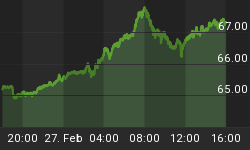Equities launched aggressively higher on Tuesday, driven essentially by pique.
The best that news hounds could do was to point to a good German confidence survey and the fact that Spain sold 12- and 18-month bills successfully. If that's worth 1.55% on the S&P, I'm unclear on why. Selling T-Bills with gallons of LTRO money sloshing around shouldn't be particularly challenging, especially because the bills will be rediscounted at the ECB for free carry. Give me a call when Spain sells 10-year notes to investors who actually have money at risk!
The Bank of Spain announced that banks under its supervision had made progress cleaning up their balance sheets. Last year, the government had estimated banks would need to take €52bln in charges, and banks have made a grand total of - drum roll - €9.19bln in improvements through the end of last year. They still need €29.1bln in additional provisions and will need to raise another €15.6bln as a capital buffer, so remarkably the Bank of Spain is claiming that banks' conditions haven't worsened since the original estimate.
Some other pundits pointed to optimistic talk out of Berlin, where a German minister said there was "no Spanish bailout talk" in Germany at the moment. That sounds more like a threat, but Schaeuble said "data don't point to bailout." The market was euphoric on this, and the DAX rose 2.65% on the day. Really? Ask yourself whether any finance minister or central banker would ever say "yep, we're pretty sure those suckers are going down. I sure hope no one starts selling bonds right now before they default because that would really make things difficult!" You can listen to ministerial pronouncements with a bias: discount positive statements and take negative statements seriously (indeed, assume the negative statements are shaded to the optimistic side).
Overnight Monday night there was a headline that would have made a great April Fool's Day joke. Japan announced that it is going to contribute $60bln to the IMF. Shouldn't that be that the IMF is contributing $60bln to Japan? Where exactly does Japan plan to get this $60bln? Presumably they will borrow it, despite the fact that they are one of the world's most-indebted governments with one of the worst demographic setups. Nice of them to contribute to the office gift, but for the sake of the gesture they could have just pitched in twenty bucks and signed the card.
U.S. data was modestly weak. Housing Starts printed 654k against expectations of 705k - but realistically, housing was never going to be what led us out of the housing-bubble-collapse - and Industrial Production was flat versus expectations of +0.3%. These aren't dreadful, but not the sort of thing that +1.55% is made out of.
Now note this: total NYSE volume was only 665mm shares, fewer than traded on Monday and the lowest total in a month. This was a rally on vapor, a ghost rally. If this is supposed to produce the next leg of the rally, it is a foundation built on sand.
.
Following on my remarks yesterday about monetarist murmurs beginning to develop among some staffers at the Fed, I take notice today of two developments in other central banks.
First, after core inflation surprised the Bank of England by rising to 2.5% year/year (it was expected to decline, to 2.3% y/y), respected Bank of England policymaker Adam Posen said "If core inflation doesn't come down on a sustained basis -- then we have to rethink." Now, core inflation in the UK had previously dropped from 3.4% in October to 2.4% in February (core inflation tends to move much more rapidly in the UK than in the US, simply because the nation is smaller and more homogeneous), so Posen has the wind at his back. In this way he is unlike, say, U.S. policymakers who are looking at 16 increases in core inflation out of the last 17 months. It is a prudent comment, even if it is easy to say in these circumstances: a surprise is a surprise, and though one surprise shouldn't cause one to reject the null hypothesis (see yesterday's comment for more on that), a thoughtful policymaker takes notice of the surprise. Especially if the policymaker doesn't believe that monetary policy is magic.
Second, the Bank of Canada held rates steady but included some hawkish words in its statement:
"In light of the reduced slack in the economy and firmer underlying inflation, some modest withdrawal of the present considerable monetary policy stimulus may become appropriate, consistent with achieving the 2 percent inflation target over the medium term."
That's not drastically different from what some Fed officials have said unofficially, but it is far ahead of the FOMC in terms of official communication.
More thinkers are starting to question the wisdom of unlimited liquidity. I don't think they're about to change the majority thinking on the topic at the FOMC, but it does raise the stakes for the majority if there are some who have strayed from the reservation and might cause trouble if they turn out to be right. All else equal, the light increase in hawkish chatter globally raises the bar slightly (ever so slightly) for QE3 here or elsewhere.















